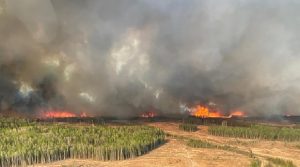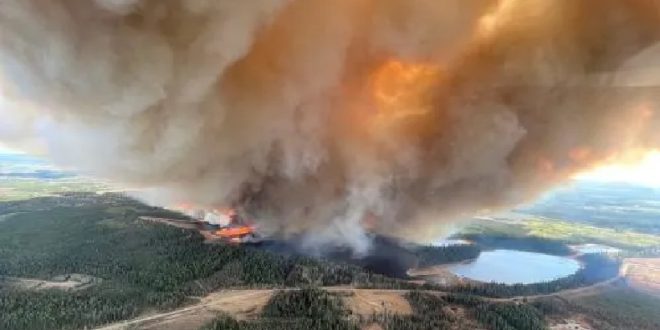16-05-2023
ALBERTA: Western Canada is bracing for a “heat dome” weather system that will push temperatures to new records over the weekend, and is likely to worsen wildfires that have already displaced tens of thousands of residents.
Seventy-five active wildfires burned in Alberta on Thursday, with 23 listed as out of control. In some areas, oil and gas production, which typically resists weather-induced shutdowns, was briefly shuttered.
 Shocking photos and drone footage reveal the destruction of rare, big-tree old-growth forests on northern Vancouver Island in Quatsino Sound
Shocking photos and drone footage reveal the destruction of rare, big-tree old-growth forests on northern Vancouver Island in Quatsino Sound
Canada: images of felled ancient tree a ‘gut-punch’, old-growth experts say
Read more
On Friday, the province’s firefighters and members of the Canadian military were working to prevent blazes from becoming “too big and powerful”, said Christie Tucker, a spokesperson for Alberta Wildfire.
A brief period of cool weather and rain helped tamp down some of the blazes, but officials will be watching carefully to see how winds interact with the hotter conditions.
“Certainly the conditions we’ve seen in the last few days have helped a significant amount and we’ve seen low fire activity, which means we’ve been able to make (some) progress on those,” Tucker told reporters. “But a wind gust will have a significant impact on a wildfire and that’s what can turn one of those smaller new starts into a larger fire very quickly.”
 Florida-based meteorologist Jeffery Berardelli told the Guardian that recent projections show a higher pressure system developing over the Canadian Prairies that is “stronger than anything we have seen” since records started four decades ago.
Florida-based meteorologist Jeffery Berardelli told the Guardian that recent projections show a higher pressure system developing over the Canadian Prairies that is “stronger than anything we have seen” since records started four decades ago.
“A ‘heat dome’ like this is a very rare occurrence in this part of the world this time of year,” he said in an email. “Historically and statistically speaking, it is rarer than a 1-in-1,000-year event.”
Berardelli said the climate of the region was now hotter than previous decades, meaning these rare events will become more likely in the coming years.
Despite the intensity of 2021 heatwave which killed more than 600 people in British Columbia and caused mass die-offs of marine life, the current weather system is unlikely to cause widespread fatalities, given the cooler night-time temperatures. (Int’l News Desk)
 Pressmediaofindia
Pressmediaofindia




